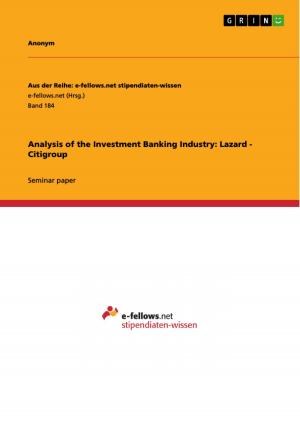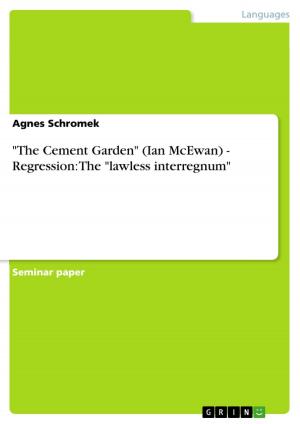With reference to the sources and relevant secondary literature examine the reasons for the success of the First Crusade.
Nonfiction, History, European General| Author: | Michael Gärtner | ISBN: | 9783638194976 |
| Publisher: | GRIN Publishing | Publication: | June 5, 2003 |
| Imprint: | GRIN Publishing | Language: | English |
| Author: | Michael Gärtner |
| ISBN: | 9783638194976 |
| Publisher: | GRIN Publishing |
| Publication: | June 5, 2003 |
| Imprint: | GRIN Publishing |
| Language: | English |
Essay from the year 2003 in the subject History Europe - Other Countries - Middle Ages, Early Modern Age, grade: 61 %, University of Wales, Aberystwyth (Department of History), 32 entries in the bibliography, language: English, abstract: Before we can consider the reasons for the success of the First Crusade, we have to first ask some initial questions that should be kept in mind throughout my essay. To begin with, we have to raise the question if the crusade was a success. To do so we have to establish what qualifies as a success. To judge its success is to compare the ideals and aims of the crusade with what happened and what was actually achieved. Here, though, we meet yet another problem in that we ask which aims should we look at? Those of pope Urban II? Those of the military leadership of the crusade, or those of the ordinary participants? Finally, we may wish to define success. Let us start by asking what the aims of the First Crusade were. The most obvious place to look for aims is Pope Urban II's speech, made on 27 November 1095 at the Council of Clermont. At this meeting Pope Urban II responded publicly for the first time to Alexius Comnenus' appeal for help against the Muslims, 'to stem the flood of Turkish violence'1, that had almost reached the Bosporus. There are four2 main accounts of the speech; those of Fulcher of Chartres, Robert the Monk, Guibert of Nogent, and Baldric of Bourgueil. His first appeal, which all four sources mention, is for the cessation of hostilities between fellow Christians and the unification of Christendom. Fulcher of Chartres quotes Urban as saying 'those who once waged war against their brothers and blood relatives should fight lawfully against barbarians'3, Robert the Monk´s account Urban comments on Christians fighting each other and advises, 'stop these hatreds among yourselves'4. In this account he even charges 'the Turks with violating the women of Anatolia'5. This account was written 25 years after Urban's call in France and does not claim to give more than a general idea of the pope's arguments. [...] 1 Penny J. Cole, The Preaching of the Crusades to the Holy Land, 1095 - 1270, (Cambridge, Mass : Medieval Academy of America, 1991), 11. 2 James A. Brundage, The crusades. Motives and Achievements. (Boston: D. C. Heath and Company, 1964), 7. 3 Jonathan and Louise Riley-Smith, The Crusades: Idea and Reality 1095-1274, (London: Edward Arnold, 1981), 42. 4 Ibid., 44. 5 P.W. Edbury (ed.), Crusade and settlement. (Cardiff: University College Cardiff Press, 1985), 61.
Essay from the year 2003 in the subject History Europe - Other Countries - Middle Ages, Early Modern Age, grade: 61 %, University of Wales, Aberystwyth (Department of History), 32 entries in the bibliography, language: English, abstract: Before we can consider the reasons for the success of the First Crusade, we have to first ask some initial questions that should be kept in mind throughout my essay. To begin with, we have to raise the question if the crusade was a success. To do so we have to establish what qualifies as a success. To judge its success is to compare the ideals and aims of the crusade with what happened and what was actually achieved. Here, though, we meet yet another problem in that we ask which aims should we look at? Those of pope Urban II? Those of the military leadership of the crusade, or those of the ordinary participants? Finally, we may wish to define success. Let us start by asking what the aims of the First Crusade were. The most obvious place to look for aims is Pope Urban II's speech, made on 27 November 1095 at the Council of Clermont. At this meeting Pope Urban II responded publicly for the first time to Alexius Comnenus' appeal for help against the Muslims, 'to stem the flood of Turkish violence'1, that had almost reached the Bosporus. There are four2 main accounts of the speech; those of Fulcher of Chartres, Robert the Monk, Guibert of Nogent, and Baldric of Bourgueil. His first appeal, which all four sources mention, is for the cessation of hostilities between fellow Christians and the unification of Christendom. Fulcher of Chartres quotes Urban as saying 'those who once waged war against their brothers and blood relatives should fight lawfully against barbarians'3, Robert the Monk´s account Urban comments on Christians fighting each other and advises, 'stop these hatreds among yourselves'4. In this account he even charges 'the Turks with violating the women of Anatolia'5. This account was written 25 years after Urban's call in France and does not claim to give more than a general idea of the pope's arguments. [...] 1 Penny J. Cole, The Preaching of the Crusades to the Holy Land, 1095 - 1270, (Cambridge, Mass : Medieval Academy of America, 1991), 11. 2 James A. Brundage, The crusades. Motives and Achievements. (Boston: D. C. Heath and Company, 1964), 7. 3 Jonathan and Louise Riley-Smith, The Crusades: Idea and Reality 1095-1274, (London: Edward Arnold, 1981), 42. 4 Ibid., 44. 5 P.W. Edbury (ed.), Crusade and settlement. (Cardiff: University College Cardiff Press, 1985), 61.















